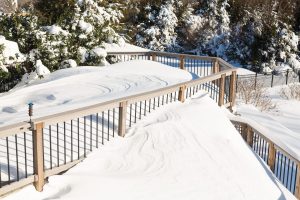 Here in the Midwest, winter weather is no joke. From freezing temperatures to heavy snow and ice, our decks will go through a lot over the next few months. Unfortunately, deck materials can show some damage. Wooden decks can absorb moisture which will be displayed in the look of the planks and in the structural integrity of the wood itself. Meanwhile, composite decking won’t acquire damage from the snow but instead from harsh shoveling. Regardless of which decking material you have, winter deck damage is always a concern. It can be costly, unsightly, and unsafe in some cases as well.
Here in the Midwest, winter weather is no joke. From freezing temperatures to heavy snow and ice, our decks will go through a lot over the next few months. Unfortunately, deck materials can show some damage. Wooden decks can absorb moisture which will be displayed in the look of the planks and in the structural integrity of the wood itself. Meanwhile, composite decking won’t acquire damage from the snow but instead from harsh shoveling. Regardless of which decking material you have, winter deck damage is always a concern. It can be costly, unsightly, and unsafe in some cases as well.
Here at Miles Bradley, we recognize how daunting maintaining a deck in the winter can be. From snow damage to scratches on the material and everything in between. Whether you need deck repairs or a full custom build this winter, fill out our free quote form to find out how we can help you! Just contact us today and get the process started.
There are two main types of decking that we specialize in; wooden and composite. Both of these decking materials face different issues concerning winter deck damage.
Wooden decks are usually more prone to damage in inclement weather due to most wood not being waterproof. This allows the material to absorb moisture from the snow. While this doesn’t typically affect the wood in the short term, besides increasing the risk of slipping on ice, it certainly can cause damage in the long run. Over time, the excess moisture collected in wood can compromise both the look and integrity of the deck itself. This can be avoided by using a proper sealant on wood to make the material waterproof which will help the look and strength of the deck last longer. Shoveling the deck and making sure to reduce exposure time to moisture will also help during periods of heavy snow.
Low-maintenance composite decking protects decks from snow damage during the winter. The composite material is waterproof which prevents moisture from seeping through and in turn, allows the deck to last in its initial condition for long periods. The issue of composite decking in the winter comes from its risk of obtaining scratches and cracks due to excessive wear and tear. To prevent this, consider winterizing your deck and using rubber shovels instead of metal when shoveling snow or ice off.
Posted In: Winter Deck Building, Winterizing decks
Tags: snow damage to decks, winter deck damage